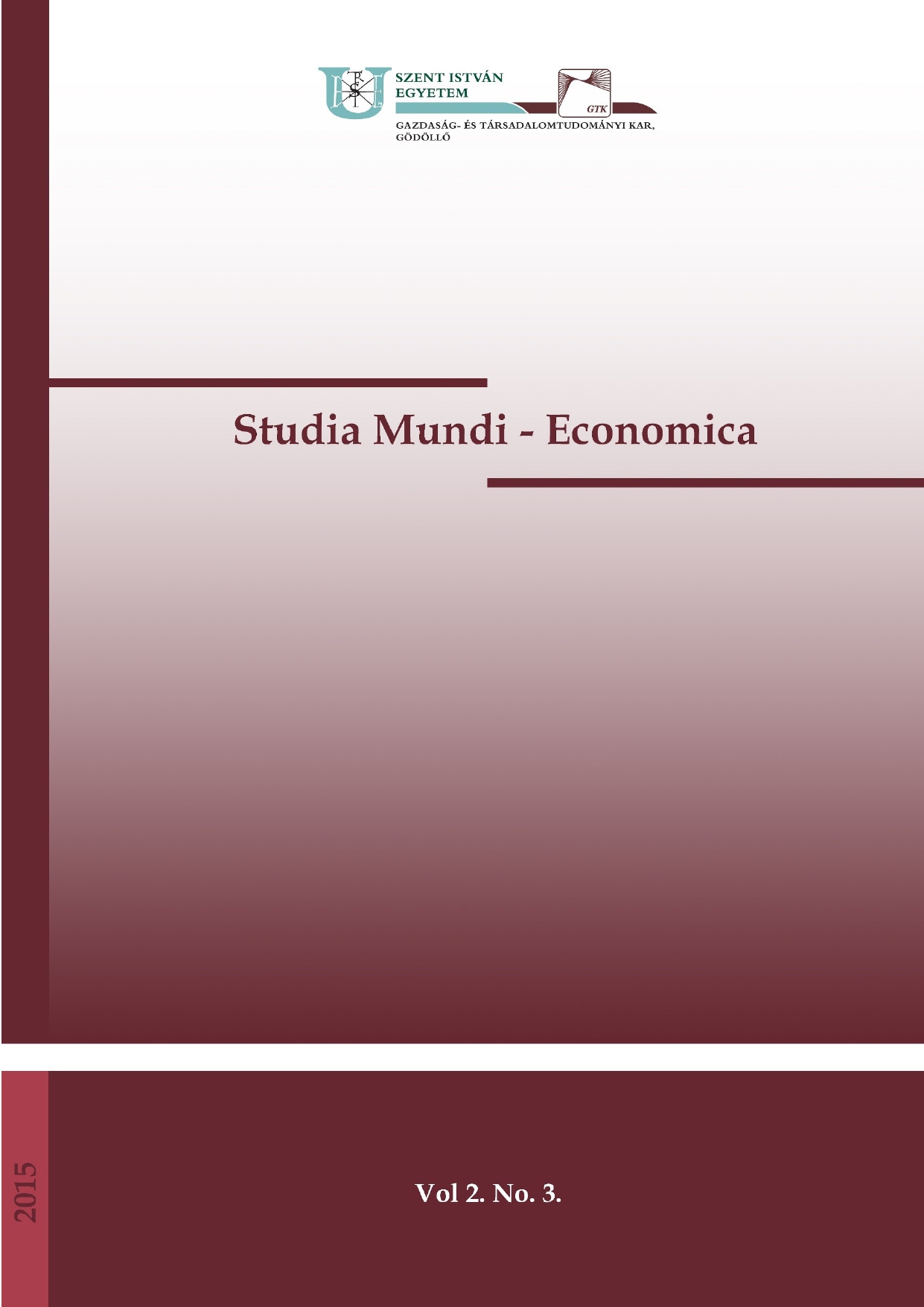Hard tasks in the communication practice of multicultural organizations
DOI:
https://doi.org/10.18531/Studia.Mundi.2015.02.03.12-20Keywords:
interkulturális kommunikáció, multikulturális döntéshozatal, stressz-szint, interakció, a kommunikáció gátlásaAbstract
In organizations people very often have to fulfill tasks causing considerable stress. One such task is negotiating major decisions with possible harmful consequences. Decision-making can cause stress overload even in a mot cultural environment using one’s own mother tongue. If decisions have to be made under multicultural conditions, stress levels may increase even further because the social-psychological problems involved in cross-cultural interactions, linguistic differences and the different decision making styles of the participants act simultaneously. As medical research shows, an excessive degree of stress will hinder or even block communication.
References
Adler, N. J. Gundersen, A. (2008): International Dimensions of Organizational Behavior. (Fifth Edition). Thomson. South-Western, Mason, OH
Balasubramanian, P. (2011): Cross-Cultural Decision Making: Impact of Values and Beliefs on Decision Choices. CRC Press.
Borgulya Iné (1999): Sztereotípiák, előítéletek és az interkulturális kommunikáció. Marketing Menedzsment1995/6 pp. 54-57
Borgulya Iné Vető Á. (2010): Kommunikációmenedzsment a vállalati értékteremtésben. Budapest, Akadémiai Kiadó
Borgulya Iné Vető Á. (2014): Kulturális távolságok. Budapest, Typotex Kiadó
Boromissza D. (2003): Az interkulturális félreértések kutatásának fő irányvonalai. Szociológiai Szemle. 2003/4. Pp. 76-87
Dietrich, R. (2007): Psycholinguistik. Metzler Vlg, Stuttgart
Frankó K. (2011): Interkulturelle Kommunikation in Ungarn tätiger Unternehmen aus dem deutschsprachigen Raum. München, Rainer Hampp Verlag
Gumperz, J.J. (1995): Mutual Inferencing in Conversation. In: Markova, I., Graumann, C.E. és Foppa, K. (Szerk.) Mutualities in Dialog. Cambridge, Cambridge University Press, pp. 101.123
Hidasi J. (2004): Interkulturális kommunikáció. Budapest, Scolar kiadó
Hofstede, G. (1980): Culture’s Consequences. International Differences in Work- Related Values. London, Beverly Hills DOI: http://dx.doi.org/10.1177/017084068300400409
Kluckhohn, F. R. Strodtbeck, F.L. (1961): Variations in Value Orientations. Evanston IL, Elmsford NY, Row, Peterson & Co. DOI: http://dx.doi.org/10.2307/2573641
Martinsons, M. G. (2001): Comparing the Decision Styles of American, Chinese and Japanese Business Leaders. Best Paper Proceedings of Academy of Management Meetings, Washington, DC, August 2001. Available at SSRN: http://ssrn.com/abstract=952292 (2015. május 10.)
Matthew, M. R. (2011): Explaining Cultural Differences in Decision Making Using Decision Field Theory. CRC Press. pp. 17–33.
Neyer, A-K. Harzing, A-W. (2008): The impact of culture on interactions: five lessons learned from the European Commission. European Management Journal. Vol. 26. 325-334 p. DOI: http://dx.doi.org/10.1016/j.emj.2008.05.005
Oksaar, E. (1991): Problematik im interkulturellen Verstehen. In: Dietrich-Müller, B. (Szerk.): Interkulturelle Wirtschaftskommunikation. München, Iudicium Verlag, pp. 13-26
Schwartz, S. H. (1994): Are there universal aspects in the content and structure of values? Journal of Social Issues, 50. pp. 19-45. DOI: http://dx.doi.org/10.1111/j.1540- 4560.1994.tb01196.x
Starcke, K., Wolf, O.T., Markowitsch, H. J. Brand, M. (2008): Anticipatory stressinfluences decision making under explicit risk conditions. Behavioral Neuroscience, Vol. 122, 1352– 1360 p. DOI: http://dx.doi.org/10.1037/a0013281
Stewart, E.C. (1985): Culture and Decision-Making. In: Gudykunst, Stwart és Ting Toomey Szerk.: Communication, Culture and Organizational Processes. Beverly Hills, Sage 177-212 p.
Thomas, A. (1991): Kulturstandards in der internationalen Begegnung. Saarbrücken, Verlag für Entwicklungspolitik
Tong, Y-Y. (2011): Why do People Think Culturally When Making Decisions? Theory and Evidence. CRC Press. pp. 53–65
Trompenaars, F.(1993): Riding the Waves of Culture. London, Nicholas Brealey Publ.,
Ungerer, D.: (2006): Stress in der Kommunikation. Erkenntnisgewinnung durch Sprachsteuerung. Beitraege zur inneren Sicherheit Bd. 29: Nachrichtendienstpsychologie. Hrsg.: Schwan, S. és Litzcke, S.M.pp. 87 - 117
Vetter, B.; Gasch, B. és Padosch, S.A. (2015): Medizinisches Handeln in Komplexen Notfallsituationen. Der Anaesthesist 4/2015. pp. 298 DOI: http://dx.doi.org/10.1007/s00101- 015-2423-2
Vitell, S.J., Nwachukwu, S.L. Barnes, J.H. (1993): The Effects of Culture on Ethical Decision-Making: An Application of Hofstede's Typology.Journal of Business Ethics. Vol. 12 753-760 p. DOI: http://dx.doi.org/10.1007/BF00881307
White, M. (2015): How stress impacts decision making. www.management-issues.com (2015.február 25.)
Downloads
Published
Issue
Section
License
Copyright (c) 2015 Borgulya Ágnes

This work is licensed under a Creative Commons Attribution-NonCommercial-NoDerivatives 4.0 International License.
A folyóirat Open Access (Gold). Cikkeire a Creative Commons 4.0 standard licenc alábbi típusa vonatkozik: CC-BY-NC-ND-4.0. Ennek értelmében a mű szabadon másolható, terjeszthető, bemutatható és előadható, azonban nem használható fel kereskedelmi célokra (NC), továbbá nem módosítható és nem készíthető belőle átdolgozás, származékos mű (ND). A licenc alapján a szerző vagy a jogosult által meghatározott módon fel kell tüntetni a szerző nevét és a szerzői mű címét (BY).






